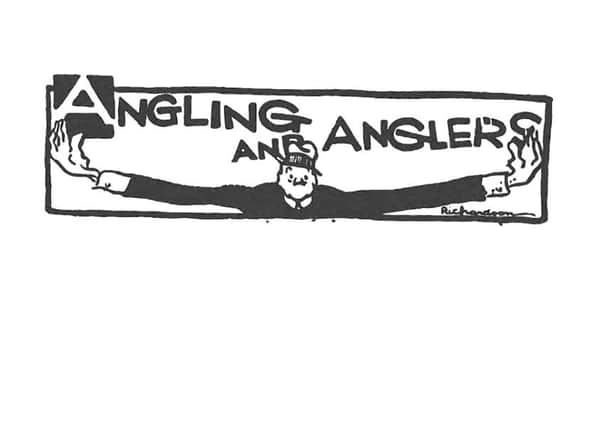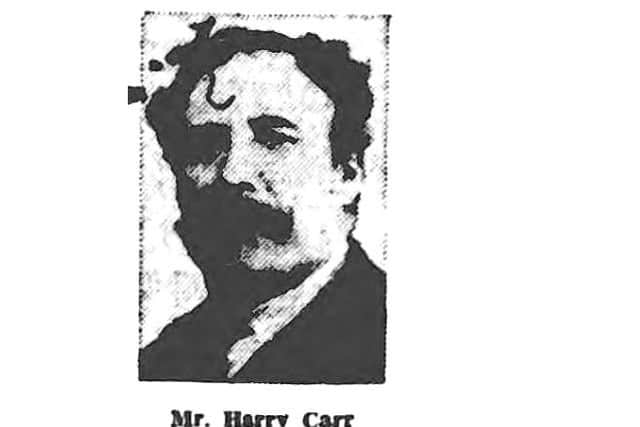On this day in Yorkshire 1936: Seasonal Angling with Harry Carr
This article contains affiliate links. We may earn a small commission on items purchased through this article, but that does not affect our editorial judgement.


Winter perch fishing is at its best, and Mr. Carr is hunting for the two-pounders. They have, of course, been taken from the Wharfe by anglers spinning the minnow for trout.
But in this season the perch prefers above all other baits a lively worm that has been carefully chosen; and in conjunction with the hook bait, worms should be thrown somewhat sparingly into the water.
Advertisement
Hide AdAdvertisement
Hide AdThe other day Mr. Carr visited a favourite spot at Woodhall; he landed six perch weighing 8lb. - the biggest one pound and six and three quarter ounces.


The fish were taken on No. 10 hook, 5 X gut, with two b.b. shots placed a foot from the hook.
Choose spot where there is a clean, sandy bottom for your perch fishing! That is Mr. Carr’s advice. Boston Spa is one of his favourite haunts, and on three visits there last season, he caught no less than three stones of perch.
He tells me that in his opinion fishing in ponds and meres for perch is rarely as satisfactory in winter as trying your luck in the river.
Advertisement
Hide AdAdvertisement
Hide AdYou must know your river intimately to get among the big perch. In the Wharfe you may find them in water from four to nine feet deep — that place where the bank overhangs perhaps, or where there is a swift, unceasing eddy; and having found the fish, if you can’t take several out of a shoal, you are no perch angler.


There is a greater sense of achievement in catching big perch than roach of similar size. Few anglers concentrate their attention on these splendid, striped beauties.
Some years ago, whenever the writer caught a good perch, the fish invariably went to the same destination — to an old man who esteemed the edible qualities of the perch above all other fish.
He would pay handsomely for good specimens.
Mr. Carr, by the way, tells me that he is genuinely concerned about this civil war in Spain. Do you know that gut may be scarce and expensive in the next few months if the cvil wardrags on?
Advertisement
Hide AdAdvertisement
Hide Ad

Says Mr. Carr “Tackle dealers are having difficulty obtaining gut from the normalsources of supply.
The war in Spain is the cause. Most of the gut comes from Spain and Italy.”
He tells me that gut has risen in price already, and if the war continues to hold up supplies, we shall feel the effect next fishing season.
If are driven to use gut substitute, the bulk of that comes from Japan. Most anglers prefer the real thing, because gut substitute tends to fray and soften more quickly the water, according expert experience.
Advertisement
Hide AdAdvertisement
Hide Ad

Many anglers are looking forward catching grayling this Christmas holiday. If only grayling were as plentiful in some Leeds Amalgamation waters as to be regarded as a pestI
I not like that slur on the grayling’s splendid reputation as a sporting fish.
Perhaps you noticed that a speaker at the Yorkshire Fishery Board meeting declared that “everyone knew grayling in trout streams were a curse.” He suggested, therefore, that in trout streams where grayling were predominant, the Board’s new by-law—limiting the coarse fish an angler may take away in any one day to 10 — should not apply.
In some of the Leeds and York Amalgamation waters, the number of grayling you may take away a day is restricted to six. The grayling the next best game fish to trout among non-migratory freshwater fish, and it may take even longer to bring him to net than trout of similar size.
Advertisement
Hide AdAdvertisement
Hide AdIt is said that being free from domestic duties, at a season when trout are spawning, the grayling plays havoc with the ova of trout. To some extent that may be true — indeed, we have the testimony of impartial observers; but many anglers believe that the damage is inconsiderable.
More important, perhaps, is the fact that the grayling is a fish of quick growth, producing a larger number of eggs than the trout; so that in a stream favourable for grayling, the increase is likely to be proportionately greater.
The majority of anglers — fly fishermen among them — owe a debt of gratitude to the grayling for the fine sport he provides while trout are spawning.
earch through our archive papers and much more at the http://www.britishnewspaperarchive.co.uk